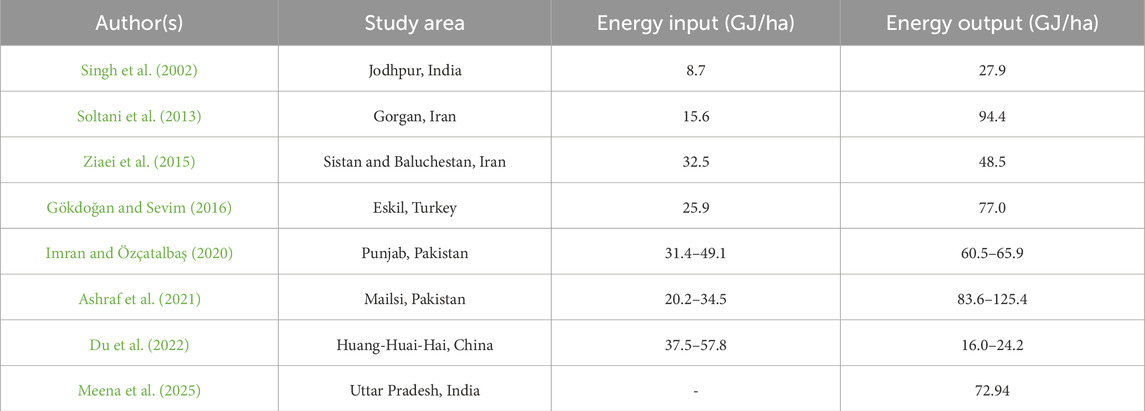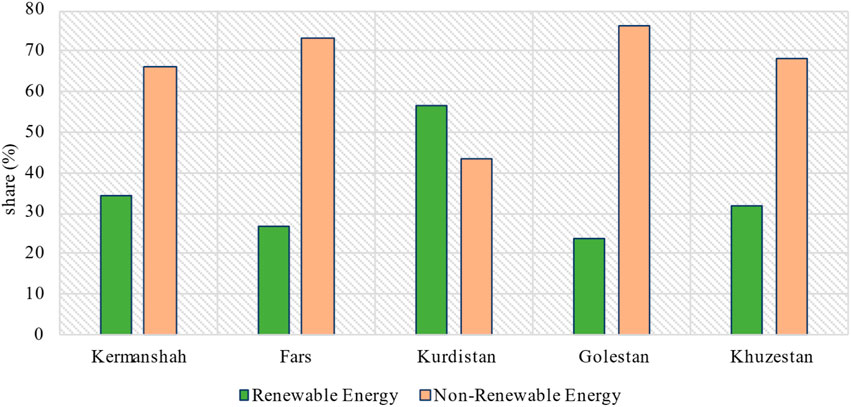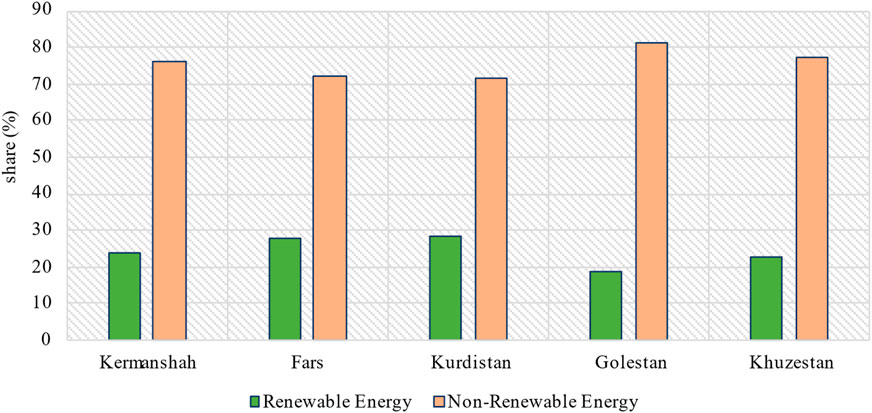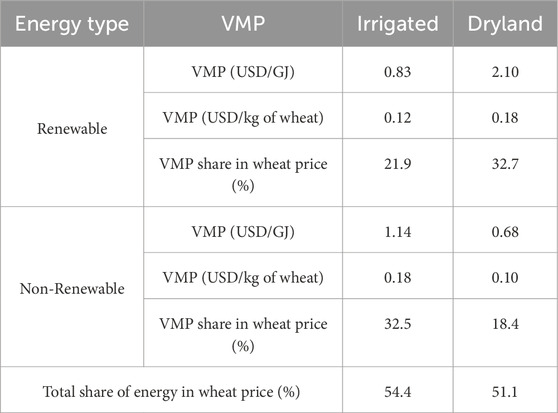- 1Department of Agricultural Economics, University of Tehran, Karaj, Iran
- 2Department of Agricultural Economics, Purdue University, West Lafayette, IN, United States
Spurred by the need to produce more food for a growing population, the agricultural sector has recently become much more resource-hungry and energy-intensive. Mismanagement and inefficiency in energy (and resource) consumption have conspicuously increased agriculture’s footprint over time. Energy use optimization necessitates a careful study of the patterns of energy and resource consumption in agriculture. This study aims to quantify the energy required for irrigated and dryland wheat production in five large wheat-producer provinces in Iran, estimating the economic value of each unit of energy input. Using energy equivalent coefficients, total energy inputs in the form of renewable and non-renewable were estimated for the period of 2001–2019. Then, to obtain the Value of Marginal Product (VMP) of the inputs, the production functions of irrigated and dryland wheat for each province were estimated. The findings show that the average marginal product and the economic value of renewable energy in the production of dryland wheat is greater than the marginal product of these inputs in the production of irrigated wheat across all provinces. Conversely, the average VMP of non-renewable energy in irrigated wheat production is greater than the corresponding amount in dryland wheat production, with the exception of Kermanshah. Renewable energy in dryland wheat has an equal economic value of 0.18 USD/ha with non-renewable energy in irrigated wheat production. Moreover, the VMP of energy contributes to about half of the price of wheat. Finally, the economic value of energy in wheat production became lower after the implementation of the Targeted Subsidies Reform Act. However, raising the energy price simply led to a shrinking of farmers’ profit margins; no improvements were achieved in the economic value of energy.
1 Introduction
In bygone days, agriculture was characterized by a heavy reliance on manpower and livestock. The mechanization of agriculture, and the use of fossil fuels and electricity, enabled the increase of food production from limited arable land to feed a fast-growing population and improve living standards (Mohammadi et al., 2008). Nowadays, agriculture is driven largely by the energy inherent in fossil fuels, which results in global warming and concomitant climate change effects (Gündoğmuş, 2006). Energy and other industrial inputs have the highest share, and emit 58% of the emissions in agriculture (Laborde et al., 2020). It is predicted that the expansion of irrigated agriculture could increase the energy use by 28%; however, implementing efficient methods has the potential to decrease the energy consumption by 50% and cut CO2e emissions by 90% (Qin et al., 2024). For Iran, it is predicted that the emissions through agriculture reach up to 47 million tons of CO2e emissions by 2050, which is 34% more than 2012 level (FAO, 2018).
Wheat, as one of the major crops of Iran, is cultivated in all provinces (Figure 1). Except for Fars province, Northern and Western provinces are the main wheat producers. In 2021, irrigated and dryland wheat cultivation encompassed 1.96 million hectares (31.3%) and 4.04 million hectares (68.1%), respectively. Between 2000 and 2018, wheat production in Iran fluctuated between 7 and 15 million tons, mainly due to unpredictable droughts (Pakrooh and Kamal, 2023) and the high dependence of dryland wheat farms on rainfall. Concurrently, per capita wheat consumption rose from 123.2 to 177.26 kg per person (Pakrooh and Kamal, 2023). The growth in demand, together with the unpredictability of wheat production, has challenged “self-sufficiency in wheat production” policy implemented by the Iranian government.
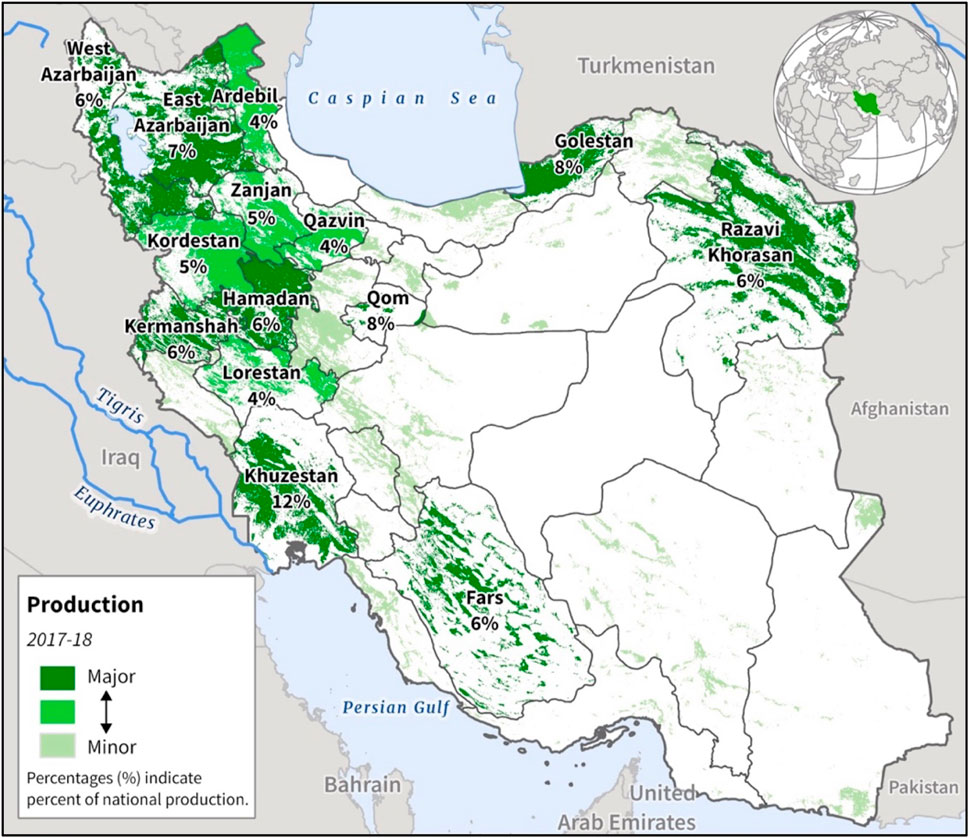
Figure 1. Iran wheat production (Foreign Agricultural Service of U.S. Department of Agriculture, 2014).
While an increase in wheat cultivation in the country is vital to ensure self-sufficiency of the staple food, it comes at a price: a rise in energy usage, which will result in more environmental impacts for agriculture. To ensure food security, the government implemented sizable subsidies to the farmers (on average, 1.4 billion USD per year), resulting in energy use inefficiencies. Because the price reflects the scarcity of a commodity, the subsidies hinder an optimal allocation of energy among the diverse sectors of the economy due to their intervention in the price system. These subsidies cause severe challenges in the form of rising GHG emissions in energy-rich countries because subsidizing energy will lead to inefficiencies in energy usage (Raei et al., 2024). Energy subsidies can be destructive due to their burden on the government budget and environmental impacts (Raei et al., 2024). World agriculture is such strongly affected by support policies that removing the subsidies can mitigate emissions in global agriculture by 34 million tons of CO2 equivalent (Laborde et al., 2020).
Due to the overwhelming amount of energy subsidies, the Iranian government has implemented the Targeted Subsidies Reform Act to liberate the economy by cutting the input and output subsidies (Zytek and Farzin, 2016). Implemented in 2010, the Targeted Subsidies Reform Act made Iran the first major oil-exporting country to eliminate domestic and agricultural energy subsidies up to 20 times (Saeediankia et al., 2023). Known as the most comprehensive economic “surgery” in modern Iran, the Targeted Subsidies Reform Act introduced higher prices for liquid fuels, natural gas, electricity, water, and public transportation (Saeediankia et al., 2023). Although the policy may decrease producers’ profits, they are expected to improve production, productivity, and competition, which tend to increase community welfare (Layani et al., 2023).
Several studies assessed the economic value and quantities of energy inputs in agriculture to investigate the optimal consumption of energy usage in Moroccan sugarcane (Mrini et al., 2001); Portuguese wheat, corn, sunflower, and barley; Italian lemon, apple, pear, peach, and apricot (Triolo et al., 1987); Malaysian rice (Bockari-Gevao et al., 2005); Turkish cherries, tomatoes, cotton, sugar beet, and greenhouse vegetables (Demircan et al., 2006; Esengun et al., 2007; Ozkan et al., 2004b; Yilmaz et al., 2005); Indian soybeans and potatoes (Mandal et al., 2002; Yadav et al., 1991); and Iranian wheat (Safa and Tabatabaeefar, 2002). Erdal et al. (2007) concluded that sugar beet consumes 39.7 GJ/ha in the Turkish province of Tokat. In a similar study, Külekçi and Aksoy (2013) found that energy consumption in small and extensive pistachio orchards is 23.45 and 20.5 GJ/ha, respectively. Among Iranian case studies, Moradi et al. (2018) and Houshyar and Grundmann (2017) revealed that conservation tillage is more energy-efficient and environmentally friendly than conventional methods in Fars province. In a more recent study, Rafiee et al. (2022) showed that the average input energy for wheat in Iran exceeds the crop’s output energy by 13.7 GJ/ha. The Targeted Subsidies Reform Act in Iran was also studied in several studies. Ahmadpour Borazjani and Sabouhi Sabouni (2015) indicated that raising the prices of the inputs (mainly energy) reduced production, welfare of producers, consumption, and exports in the agriculture sector, dramatically. To assess the environmental impacts of the Targeted Subsidies Reform Act in Iranian agriculture sector, Khaledi et al. (2011) concluded that the policy has the potential to decrease gasoline demand by a maximum of 997 million L/year. The study did not estimate any potential reduction in GHG emissions resulting from the policy, and the reduction in inputs was the only environmental criterion considered. In a more detailed study, Solaymani (2021) concluded that the policy decreased the demand for energy by 10% while causing a 7% decline in CO2 emissions.
Energy consumption and the economic value of agricultural inputs and outputs have been studied separately in different studies. Also, some studies investigated the impacts of the Targeted Subsidies Reform Act on the energy and environment of Iran. Still, none of the studies have estimated the economic value of wheat in Iran per energy unit before and after the Targeted Subsidies Reform Act. This paper seeks to bridge this gap by estimating the energy value in the production of irrigated and dryland wheat farms in selected provinces in Iran. Furthermore, this paper assesses the impacts of Iran’s Targeted Subsidies Reform policy implemented in 2011.
2 Materials and methods
2.1 Study area and data
The study focuses on the five wheat-producing provinces in Iran: Kermanshah, Fars, Kurdistan, Khuzestan, and Golestan. These provinces collectively produce 37 percent of the country’s wheat (Figure 1). They were chosen due to their significant contribution to wheat production, diverse climatic conditions, agricultural practices, and data availability. This diversity allows for a comprehensive analysis of energy use patterns and their economic implications in wheat farming nationwide.
To measure the input energy in wheat production, the values of the inputs are required. These data for the study area were obtained from the Iran Ministry of Agriculture-Jahad from 2000 to 2019. The energy equivalent of inputs/outputs of wheat farms sourced from Rafiee et al. (2022) are in Supplementary Table S1. Accordingly, renewable energy covers seed, manure, human labor, and irrigation water. On the other hand, chemical fertilizers, pesticides, electricity, machinery, and diesel fuel are considered non-renewable energy.
2.2 The economic value of energy
Energy use in the agricultural sector can be bifurcated into direct and indirect energy use. It can also be segmented into renewable and non-renewable energy demands (Beheshti Tabar et al., 2010). Direct energy includes all energy used directly in the field, from sowing seeds to harvesting crops; however, indirect energy includes the embedded energy in the production/fabrication/manufacture, packaging, and transport/conveyance of all inputs, such as chemical fertilizers, pesticides, and agricultural machinery (Ozkan et al., 2004a). Likewise, labor, seeds, animal manure, and water are regarded as renewable energy, while the energy embedded in chemical fertilizers, pesticides, and machinery is non-renewable (Erdal et al., 2007; Mohammadi et al., 2008; Zangeneh et al., 2010).
Determining the marginal product of energy in wheat production requires estimating the production function. The production function depends on the production technology adopted. Flexible1 (translog, generalized quadratic, and generalized Leontief) and inflexible (Cobb-Douglas and transcendental) functions have been commonly used (Ahmadzai and Heydayat, 2020; Betz et al., 2015; Kumbhakar, 1994; Mehmood et al., 2015; Mehrjerdi and Mark, 2018). In this study, to evaluate the marginal production and the economic value of renewable and non-renewable energies, we implemented the classical production functions. After estimating several production forms, we used classical assumption tests and other econometric tests, such as significant percentage and residual normality test (Greene, 2003; Thompson, 1988), to select the best form of the wheat production function. Accordingly, the generalized quadratic mentioned in Equation 1 was selected as the best functional form (Chambers, 1988):
in which renewable (RE) and non-renewable (NRE) energies are the main inputs, and the output (EW) is the amount of energy equivalent to the yield of wheat. As mentioned previously, we used the data from Rafiee et al. (2022), in which seed, manure, human labor, and irrigation water are sources of renewable energy, and chemical fertilizers, pesticides, electricity, machinery, and diesel fuel are non-renewable energy. The abovementioned functional form was estimated for irrigated and dryland wheat in the five Iranian provinces of Kermanshah, Fars, Kurdistan, Khuzestan, and Golestan. First, the marginal product of each variable (
where Xi is the input (RE or NRE).
Subsidies intervene in the markets through price systems. The price reflects the scarcity of that commodity; therefore, information about the price or economic value of energy is necessary for energy demand management. An overestimation/underestimation of the energy value hinders an optimal allocation of energy among the diverse sectors of the economy. According to economic theory, the marginal cost of an operating input should be equal to its marginal price in equilibrium under the assumptions of constant returns to scale and a competitive market (Abraham et al., 2009; Caselli et al., 2021). Therefore, energy forms with higher marginal products should be more expensive than those with lower marginal products (Kaufmann, 1994). Then, the economic value of each input was obtained by Equation 3 (Varian, 2014):
in which Py is the product price (the price per unit of wheat energy) and VMPxi is the value of the marginal product of the input xi or the economic price of xi. MPxi shows how much energy is produced for one unit of consuming Xi. Moreover, VMP is the corresponding value of energy produced for one USD of consuming Xi as an input. Therefore, MP and VMP are efficiency indexes in our study. For the optimal level of production, the value of the marginal product of a factor should equal its price (Varian, 2014). We estimate VMP for the years preceding (S1) and following (S2) Iran’s Targeted Subsidies Reform Act. Then, we will compare VMP with the input price under both scenarios to see how the policy could help to achieve the optimal level of production.
Since we are using time-series data, we need to check whether the variables are stationary. Considering the wide application of time-series data in various types of research, it is always assumed that the time series is stationary. Otherwise, the statistical tests based on t, F, etc., are doubted, and spurious regression exists (Dougherty 2011). For the Unit Root Test, we implemented the Augmented Dickey-Fuller (ADF) test developed by Dickey and Fuller (1979) to determine the stationarity of time series data. The test considers first-order autoregressive process in Equation 4 to investigate the existence of a unit root (Dickey and Fuller, 1979):
where yt and yt-1 are each variable in time t and in time t-1, respectively. For testing autocorrelation, we used the Durbin-Watson statistic, which was introduced by Durbin and Watson (1971). We also used SHAZAM 10.2, first introduced by White (1978), to estimate the econometric models.
3 Results and discussion
Data regarding the energy input and output for both irrigated and dryland wheat production are provided in Supplementary Figures S1-4 in the Supplementary Material. Also, the descriptive statistics of energy consumption for wheat production in five provinces over the 20-year time period of 2000–2019 are provided in Supplementary Tables S1-4. Accordingly, Fars province had the highest energy consumption for irrigated wheat, with an average of 36.2 GJ/ha. For dryland wheat, farmers in Golestan province consumed the most energy, with 15.56 GJ/ha. For energy output, Kermanshah topped the list for irrigated wheat with an average of 56.8 GJ, while Golestan was the first for dryland wheat with an average energy output of 28.7 GJ. However, earlier studies such as Singh et al. (2002) concluded that energy input at wheat farms can be as low as 8.73 GJ/ha due to the lower consumption of inputs in India; later studies estimated more comparable energy inputs to the current study. Ashraf et al. (2020) also investigated wheat production in Pakistan and estimated an average input energy consumed of 27.06 GJ/ha. In a similar study, Du et al. (2022) estimated 27.1–30.4 GJ/ha farm-level energy inputs for wheat in China. Regarding the energy output, Meena et al. (2025) reported the energy output of 72.94 GJ/ha for wheat, which is comparable to our results. Table 1 provides more comparable studies.
Figures 2, 3 illustrate the renewable and non-renewable energy shares (%) in irrigated and dryland wheat production, respectively. In general, the share of non-renewable energy is more than renewable energy for both irrigated and dryland wheat production; however, irrigated wheat in Kurdistan is an exception. For irrigated wheat in Kurdistan, more than 55% of energy consumption comes from renewable sources. Ashraf et al. (2021) also concluded that non-renewable energy has a higher share at wheat farms in Pakistan. In a more comparable study to the current study, Soltani et al. (2013) concluded that renewable energy accounts for 18% of the total energy input, and non-renewable energy comprises 82% of the total energy at wheat farms in Iran.
The results of the estimation of the production functions are provided in Supplementary Tables S5, S6. Accordingly, all the variables in the estimated production functions have significant impacts on production. Singh et al. (2002) also came upon a non-linear relationship between wheat yield and energy production. F-statistic shows that the total estimated regression is significant (see Supplementary Tables S5, S6). Durbin-Watson statistic also indicates the absence of autocorrelation in the disturbance components of the patterns. Also, the Dickey-Fuller test statistic for the residuals of all models is significant, which points to the absence of spurious regression.
Table 2 provides the estimated marginal product (MP), the economic value of renewable energy (VMP), and the ratio of VMP to the price of wheat. Houshyar et al. (2015) also obtained comparable MP for farm-level renewable energy in Iran. These results indicate that the average marginal production of renewable energies in the production of dryland wheat for all provinces is greater than the marginal product of the inputs for irrigated wheat. The biggest gap is for Kermanshah, where the MP of renewable energies in dryland wheat is 215% greater than the corresponding amount for irrigated wheat. The greater MP of renewable energy in dryland wheat resulted in a higher economic value. In Kermanshah, the average economic value of renewable energies for irrigated and dryland are $0.49 and $2.35 per GJ, respectively2. The higher MP of renewable energy in dryland wheat production has caused a higher share of this input in VMP.
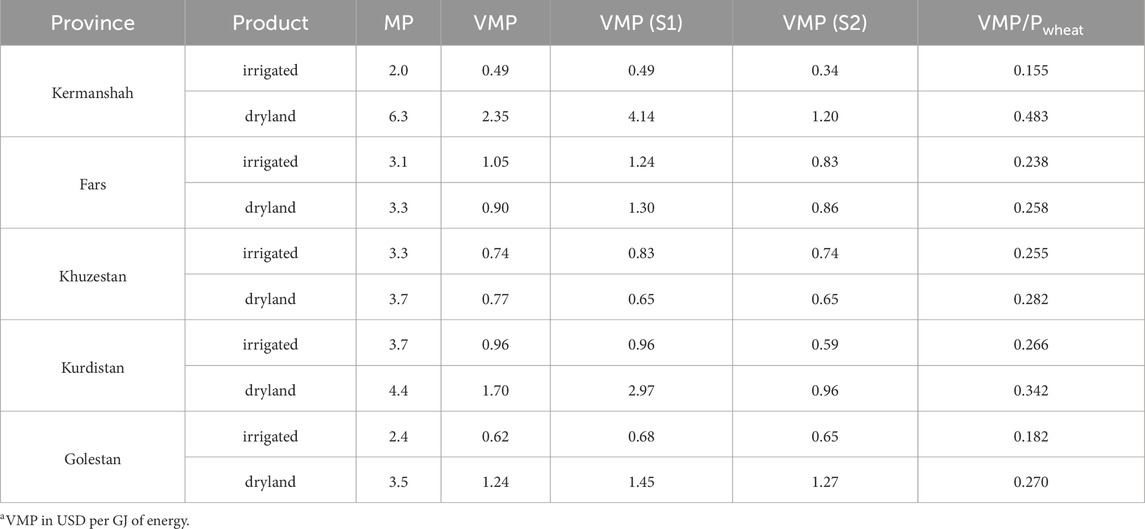
Table 2. Average marginal production (MP) and economic value (VMPa) of renewable energy in wheat production.
Due to the decrease in the real prices of energy carriers, along with the rapid growth of energy consumption and the increase in the financial burden of subsidies on the government’s general budget, the Targeted Subsidies Reform Act was implemented by Iranian government, and legislation came into force in 2011. In this research, to investigate the impact of this policy on the economic value of energy in the agricultural sector, the average economic value of energy has been investigated in two time periods—before (S1) and after (S2) the targeted subsidies. In order to ensure comparability, the number of years in each of the two periods is considered to be the same. As shown in Table 2, after the implementation of the targeted subsidies policy in Iran, the average economic value of renewable energy in wheat production has decreased in all five provinces. It is thereby clear that the policy not only did not lead to an improvement of the economic value of energy in wheat production but also resulted in a negative performance in this area. The reason is that the government’s intention or objective behind this legislation was to increase the price of direct energy, and it was believed that this would lead to an optimization of energy use in the agricultural sector. As this study has shown, the economic value of energy in wheat production became lower after the Targeted Subsidies Reform Act. The price increase simply led to a shrinking of farmers’ profit margins without any gains in improving the economic value of renewable energy. Increasing productivity in wheat production and improving the marginal production of energy should have been given serious attention by policymakers before the energy prices were hiked.
Similar to Tables 2, 3 provides the results for non-renewable energy. Unlike renewable energy, the average MP of non-renewable energy in the production of irrigated wheat is greater than the MP for dryland wheat in all provinces except in Kermanshah province. The average MP of non-renewable energy in the production of irrigated wheat is 75% greater than that for dryland wheat. In the same way, except in Kermanshah province, the VMP of non-renewable energy of irrigated wheat is greater than that for dryland wheat. For example, in Fars province, the economic value of non-renewable energy for irrigated and dryland wheat is equal to $1.7 and $0.37 per GJ, consecutively. Similar to the results of renewable energy, the economic value of non-renewable energy input after implementing the Targeted Subsidies Reform Act has decreased.
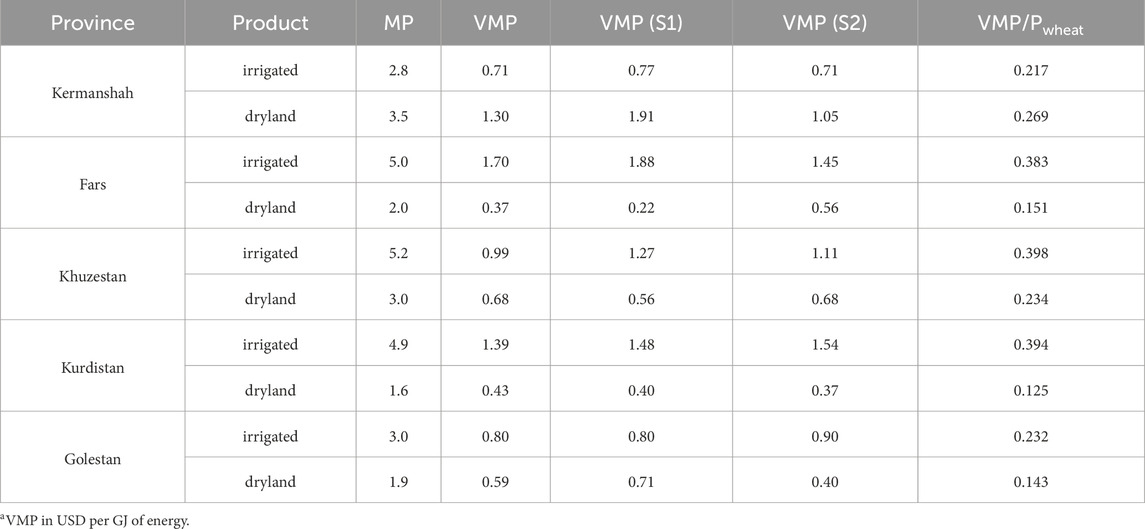
Table 3. Average marginal production (MP) and economic value (VMP) of non-renewable energy in wheat production.
Table 4 summarizes the results of the economic value of renewable and non-renewable energies in the production of irrigated and dryland wheat. Non-renewable energy has more economic value than renewable energy in irrigated wheat; however, it is the opposite for dryland wheat. Renewable energy has a higher share in dryland wheat than irrigated wheat (32.7% versus 21.9%). Therefore, considering the average price of Iranian wheat ($0.56), the economic value of renewable energy per kg of irrigated and dryland wheat are 0.12 USD and 0.18 USD, respectively. Interestingly, renewable energy in dryland wheat has equal economic value (0.18 USD/hg) with non-renewable energy in irrigated wheat production. Finally, examining the share of the final production value of renewable and non-renewable energies from the real price of wheat shows that the VMP of energy is almost 50% of the selling price of wheat.
In a similar study to our study, Shokoohi et al. (2022) investigated the impacts of Iranian Targeted Subsidies Reform Act on dairy farms. Their results showed that the dairy farms’ efficiency has decreased after the Targeted Subsidies Reform. They estimated a 17% decrease in production efficiency compared with the period before implementing the policy. According to (Shokoohi et al., 2022), the policy negatively impacted structural changes in Iran’s economy and also caused instability in the market. They suggested policies to support the producers in managing the market risk. Barkhordar et al. (2018) also investigated the role of Iranian Targeted Subsidies Reform in energy efficiency. They mainly focused on the barriers to energy efficiency improvements after implementing Targeted Subsidies Reform. They concluded that there are informational, financial, and regulatory barriers that impede energy efficiency across different sectors in Iran.
4 Conclusion
Optimizing energy use in the agricultural sector is indispensable and of paramount importance globally. The authors were motivated by the need to examine the pattern of energy consumption in the economy in general, the agricultural sector in Iran in particular, and irrigated and dryland wheat production in five selected provinces in the country. Energy inputs were categorized as renewable and non-renewable. Of the five provinces, Fars and Golestan had the highest amount of input energy used in the production of irrigated and dryland wheat, respectively. The results of investigating the energy content of irrigated and dryland wheat in the study area showed that the highest amount of “embedded” crop energy of irrigated and dryland wheat products was in Kurdistan and Golestan provinces, respectively.
Estimated MP showed that the average marginal product and the economic value of renewable energy in the production of dryland wheat in all five provinces is greater than the marginal product of these inputs in the production of irrigated wheat. In contrast, the average MP of non-renewable energy in irrigated wheat production is greater than the MP of the inputs in dryland wheat production in all provinces except Kermanshah. Moreover, non-renewable energy in irrigated wheat has a higher economic value, but renewable energy dominates in the production of dryland wheat. The comparison of the share of VMP of renewable and non-renewable energy from the actual price of wheat shows that the economic value of these inputs is about half of the price of wheat. The total economic value of renewable and non-renewable energy in irrigated and dryland wheat production is 54.4% and 51.1% of the price of wheat, respectively.
The low economic value of energy in Iran is due to the fact that policymakers have not prioritized improvements in production efficiency. To boost food production, and improve self-sufficiency, fertilizer and pesticide subsidies have been provided to farmers, and this has obliterated any motivation for optimizing resource usage. The current study emphasizes that the increase in the price of energy alone, without paying attention to energy efficiency improvements in wheat production, will not suffice. Existing subsidies deserve consideration. It, however, goes without saying that providing food to the population and targeting self-sufficiency will surely remain topmost on the agenda of the policymakers. If this can be done sustainably, it would be a win-win-win for sure—environmentally, economically, and socially.
Data availability statement
The original contributions presented in the study are included in the article/Supplementary Material, further inquiries can be directed to the corresponding author.
Author contributions
HR: Supervision, Validation, Writing – original draft, Writing – review and editing, Conceptualization, Methodology. OK: Supervision, Validation, Writing – original draft, Writing – review and editing, Funding acquisition, Project administration, Visualization. AK: Data curation, Formal Analysis, Investigation, Software, Visualization, Writing – original draft, Writing – review and editing. RS: Data curation, Formal Analysis, Investigation, Software, Visualization, Writing – original draft, Writing – review and editing. AK: Data curation, Formal Analysis, Investigation, Software, Visualization, Writing – original draft, Writing – review and editing.
Funding
The author(s) declare that no financial support was received for the research and/or publication of this article.
Conflict of interest
The authors declare that the research was conducted in the absence of any commercial or financial relationships that could be construed as a potential conflict of interest.
Generative AI statement
The author(s) declare that no Generative AI was used in the creation of this manuscript.
Publisher’s note
All claims expressed in this article are solely those of the authors and do not necessarily represent those of their affiliated organizations, or those of the publisher, the editors and the reviewers. Any product that may be evaluated in this article, or claim that may be made by its manufacturer, is not guaranteed or endorsed by the publisher.
Supplementary material
The Supplementary Material for this article can be found online at: https://www.frontiersin.org/articles/10.3389/fenrg.2025.1522280/full#supplementary-material
Footnotes
1Flexibility in functional forms was first proposed by Diewert (1971). It implies the presence of free parameters (flexibility, in other words) to arrive at an approximation (usually second order) of any arbitrary function (Ray et al. 2020).
2In order to eliminate the effect of inflation, all prices are converted to the base year of 2016 by the producer price index (PPI) in the agricultural sector.
References
Abraham, F., Konings, J., and Vanormelingen, S. (2009). The effect of globalization on union bargaining and price-cost margins of firms. Rev. World Econ. 145 (1), 13–36. doi:10.1007/s10290-009-0003-8
Ahmadpour Borazjani, M., and Sabouhi Sabouni, M. (2015). The impact of iranian subsidies targeted plan on agricultural sector (Regional agricultural sector modeling). QJER 15 (2), 157–182. Available Online at: http://ecor.modares.ac.ir/article-18-1446-en.html
Ahmadzai, N., and Heydayat, Y. (2020). Technical efficiency of improved and traditional wheat varieties in Paktia, Afghanistan: a comparative stochastic frontier production function analysis. Int. J. Sci. Res. Publ. (IJSRP) 10, 917–925. doi:10.29322/IJSRP.10.09.2020.p105112
Ashraf, M. N., Mahmood, M. H., Sultan, M., Banaeian, N., Usman, M., Ibrahim, S. M., et al. (2020). Investigation of input and output energy for wheat production: a comprehensive study for tehsil mailsi (pakistan). Sustainability 12 (17), 6884. doi:10.3390/su12176884
Ashraf, M. N., Mahmood, M. H., Sultan, M., Shamshiri, R. R., and Ibrahim, S. M. (2021). Investigation of energy consumption and associated CO2 emissions for wheat–rice crop rotation farming. Energies 14 (16), 5094. doi:10.3390/en14165094
Barkhordar, Z. A., Fakouriyan, S., and Sheykhha, S. (2018). The role of energy subsidy reform in energy efficiency enhancement: lessons learnt and future potential for Iranian industries. J. Clean. Prod., 197, 542–550. doi:10.1016/j.jclepro.2018.06.231
Beheshti Tabar, I., Keyhani, A., and Rafiee, S. (2010). Energy balance in Iran’s agronomy (1990–2006). Renew. Sustain. Energy Rev. 14 (2), 849–855. doi:10.1016/j.rser.2009.10.024
Betz, M. R., Partridge, M. D., Farren, M., and Lobao, L. (2015). Coal mining, economic development, and the natural resources curse. Energy Econ. 50, 105–116. doi:10.1016/j.eneco.2015.04.005
Bockari-Gevao, S., Wan Ismail, W. I., Yahya, A., and Wan, C. (2005). Analysis of energy consumption in lowland rice-based cropping system of Malaysia. Songklanakarin J. Sci. Technol. 27, 820–827. Available Online at: https://sjst.psu.ac.th/journal/27-4/13-energy-consumption.pdf.
Caselli, M., Nesta, L., and Schiavo, S. (2021). Imports and labour market imperfections: firm-Level evidence from France. Eur. Econ. Rev. 131, 103632. doi:10.1016/j.euroecorev.2020.103632
Demircan, V., Ekinci, K., Keener, H. M., Akbolat, D., and Ekinci, C. (2006). Energy and economic analysis of sweet cherry production in Turkey: a case study from Isparta province. Energy Convers. Manag. 47 (13), 1761–1769. doi:10.1016/j.enconman.2005.10.003
Dickey, D. A., and Fuller, W. A. (1979). Distribution of the estimators for autoregressive time series with a unit root. J. Am. Stat. Assoc. 74 (366), 427–431. doi:10.2307/2286348
Diewert, W. E. (1971). An application of the Shephard Duality theorem: A generalized Leontief production function. J. Pol. Econ. 79 (3), 481–507. doi:10.1086/259764
Dougherty, C. (2011). Introduction to Econometrics. Fourth Edn. OUP Catalogue, Oxford University Press.
Du, X., He, W., Gao, S., Liu, D., Wu, W., Tu, D., et al. and (2022). Raised bed planting increases economic efficiency and energy use efficiency while reducing the environmental footprint for wheat after rice production. Energy, 245, 123256. doi:10.1016/j.energy.2022.123256
Durbin, J., and Watson, G. S. (1971). Testing for serial correlation in least squares regression. III. Biometrika 58 (1), 1–19. doi:10.2307/2334313
Erdal, G., Esengün, K., Erdal, H., and Gündüz, O. (2007). Energy use and economical analysis of sugar beet production in Tokat province of Turkey. Energy 32 (1), 35–41. doi:10.1016/j.energy.2006.01.007
Esengun, K., Erdal, G., Gündüz, O., and Erdal, H. (2007). An economic analysis and energy use in stake-tomato production in Tokat province of Turkey. Renew. Energy 32 (11), 1873–1881. doi:10.1016/j.renene.2006.07.005
FAO (2018). The future of food and agriculture - alternative pathways to 2050. Available Online at: https://www.fao.org/global-perspectives-studies/food-agriculture-projections-to-2050/en/.
Gökdoğan, O., and Sevim, B. (2016). Determination of energy balance of wheat production in Turkey: a case study of eskil district. Tekirdağ Ziraat Fakültesi Derg. 13 (4). Available Online at: https://bhi.nku.edu.tr/basinyonetim/resim/images/editorresimleri/522/files/06_osman_gokdogan%20(1).pdf.
Greene, W. (2003). Econometric analysis. Fifth Edition. Upper Saddle River, New Jersey: Prentice Hall.
Gündoğmuş, E. (2006). Energy use on organic farming: a comparative analysis on organic versus conventional apricot production on small holdings in Turkey. Energy Convers. Manag. 47 (18), 3351–3359. doi:10.1016/j.enconman.2006.01.001
Houshyar, E., Dalgaard, T., Tarazkar, M. H., and Jørgensen, U. (2015). Energy input for tomato production what economy says, and what is good for the environment. J. Clean. Prod., 89, 99–109. doi:10.1016/j.jclepro.2014.11.022
Houshyar, E., and Grundmann, P. (2017). Environmental impacts of energy use in wheat tillage systems: a comparative life cycle assessment (LCA) study in Iran. Energy 122, 11–24. doi:10.1016/j.energy.2017.01.069
Imran, M., and Özçatalbaş, O. (2020). Energy use efficiency in irrigated and rainfed wheat in Pakistan. doi:10.5772/intechopen.95284
Kaufmann, R. K. (1994). The relation between marginal product and price in US energy markets: implications for climate change policy. Energy Econ. 16 (2), 145–158. doi:10.1016/0140-9883(94)90009-4
Khaledi, M., Amjadi, A., and Kazemnejad, M. (2011). The environmental effects of energy-subsidy reforms in Iranian agricultural sector. Asian Soc. Agric. Econ. (ASAE) 7th Int. Conf. doi:10.22004/ag.econ.290435
Külekçi, M., and Aksoy, A. (2013). Input–output energy analysis in pistachio production of Turkey. Environ. Prog. and Sustain. Energy 32 (1), 128–133. doi:10.1002/ep.10613
Kumbhakar, S. C. (1994). Efficiency estimation in a profit maximising model using flexible production function. Agric. Econ. 10 (2), 143–152. doi:10.1016/0169-5150(94)90003-5
Laborde, D., Mamun, A., Martin, W., Piñeiro, V., and Vos, R. (2020). “Modeling the impacts of agricultural support policies on emissions from agriculture,” in Working paper series (Massachusetts Avenue Cambridge, MA: National Bureau of Economic Research). doi:10.3386/w27202
Layani, G., Mehrjou, S., and Farajzadeh, Z. (2023). Effects of government policies reform on environmental sustainability: an integrated approach of PMP and system dynamics simulation model. J. Clean. Prod., 426, 138985. doi:10.1016/j.jclepro.2023.138985
Mandal, K. G., Saha, K. P., Ghosh, P. K., Hati, K. M., and Bandyopadhyay, K. K. (2002). Bioenergy and economic analysis of soybean-based crop production systems in central India. Biomass Bioenergy 23 (5), 337–345. doi:10.1016/S0961-9534(02)00058-2
Meena, R. S., Pradhan, G., and Kumar, S. (2025). Energy flow, eco-efficiency, and economic circulation with recycled industrial waste compost application in wheat and subsequent rice farming. Sci. Total Environ., 967, 178779. doi:10.1016/j.scitotenv.2025.178779
Mehmood, B., Nisar, A., and Rehman, H. ur. (2015). Technology matters: evidence from pakistani banking sector using flexible transcendental logarithmic production function. Pak. Econ. Soc. Rev. 53 (2), 203–224. Available Online at: http://www.jstor.org/stable/26153257.
Mehrjerdi, M. Z., and Mark, T. (2018). Estimating the productivity of wheat production: an implication of stochastic frontier production function model 13. doi:10.22004/ag.econ.266774
Mohammadi, A., Tabatabaeefar, A., Shahin, S., Rafiee, S., and Keyhani, A. (2008). Energy use and economical analysis of potato production in Iran a case study: ardabil province. Energy Convers. Manag. 49 (12), 3566–3570. doi:10.1016/j.enconman.2008.07.003
Moradi, M., Nematollahi, M. A., Mousavi Khaneghah, A., Pishgar-Komleh, S. H., and Rajabi, M. R. (2018). Comparison of energy consumption of wheat production in conservation and conventional agriculture using DEA. Environ. Sci. Pollut. Res. 25 (35), 35200–35209. doi:10.1007/s11356-018-3424-x
Mrini, M., Senhaji, F., and Pimentel, D. (2001). Energy analysis of sugarcane production in Morocco. Environ. Dev. Sustain. 3 (2), 109–126. doi:10.1023/A:1011695731580
Ozkan, B., Akcaoz, H., and Fert, C. (2004a). Energy input–output analysis in Turkish agriculture. Renew. Energy 29 (1), 39–51. doi:10.1016/S0960-1481(03)00135-6
Ozkan, B., Akcaoz, H., and Karadeniz, F. (2004b). Energy requirement and economic analysis of citrus production in Turkey. Energy Convers. Manag. 45 (11), 1821–1830. doi:10.1016/j.enconman.2003.10.002
Pakrooh, P., and Kamal, M. A. (2023). Modeling the potential impacts of climate change on wheat yield in Iran: evidence from national and provincial data analysis. Ecol. Model., 486, 110513. doi:10.1016/j.ecolmodel.2023.110513
Qin, J., Duan, W., Zou, S., Chen, Y., Huang, W., and Rosa, L. (2024). Global energy use and carbon emissions from irrigated agriculture. Nat. Commun. 15 (1), 3084. doi:10.1038/s41467-024-47383-5
Raei, H., Maleki, A., and Farajzadeh, Z. (2024). Analysis of energy policy reform in Iran: energy and emission intensity changes. Econ. Analysis Policy, 81, 1535–1557. doi:10.1016/j.eap.2024.02.023
Rafiee, H., Mehrparvar hosseini, E., Amini Zadeh, M., Aghasafari, H., and Mohammadi, A. (2022). A cluster analysis on the energy use indicators and carbon footprint of irrigated wheat cropping systems. Sustainability 14 (7), 4014. doi:10.3390/su14074014
Ray, S. C., Chambers, R., and Kumbhakar, S. (2020). Handbook of Production Economics. Singapore: Springer Singapore, Imprint.
Saeediankia, A., Emamgholipour, S., Pouraram, H., Mousavi, A., and Majdzadeh, R. (2023). Impact of targeted subsidies reform on household nutrition: lessons learned from Iran. Iran. J. Public Health 52 (7), 1504–1513. doi:10.18502/ijph.v52i7.13253
Safa, M., and Tabatabaeefar, A. (2002). Fuel consumption in wheat production in irrigated and dry land farming. World J. Agric. Sci. 4, 86–90. Available Online at: https://www.idosi.org/wjas/wjas4(1)/16.pdf.
Shokoohi, Z., Bakhshoodeh, M., and Asgari, M. (2022). Reform and the efficiency of dairy farms in Iran: a comprehensive evaluation. Iran. J. Econ. Stud. 10 (2), 391–410. doi:10.22099/ijes.2022.40872.1757
Singh, H., Mishra, D., and Nahar, N. M. (2002). Energy use pattern in production agriculture of a typical village in arid zone, india––Part I. Energy Convers. Manag., 43(16), 2275–2286. doi:10.1016/S0196-8904(01)00161-3
Solaymani, S. (2021). Energy subsidy reform evaluation research – reviews in Iran. Greenh. Gases Sci. Technol., 11(3), 520–538. doi:10.1002/ghg.2064
Soltani, A., Rajabi, M. H., Zeinali, E., and Soltani, E. (2013). Energy inputs and greenhouse gases emissions in wheat production in gorgan, Iran. Energy, 50, 54–61. doi:10.1016/j.energy.2012.12.022
Thompson, G. D. (1988). Choice of flexible functional forms: review and appraisal. West. J. Agric. Econ. 13 (2), 15. doi:10.22004/ag.econ.32127
Triolo, L., Unmole, H., Mariani, A., and Tomarchio, L. (1987). Energy analyses of agriculture: the Italian case study and general situation in developing countries, 172–184.
Varian, H. R. (2014). Intermediate microeconomics: a modern approach. Ninth edition. New York: W.W. Norton and Company.
White, K. J. (1978). A general computer for econometric Models-Shazam. Econometrica 46 (1), 239–240. doi:10.2307/1913664
Yadav, R. N., Singh, R. K. P., and Prasad, S. (1991). An economic analysis of energy requirements in the production of potato crop in biharsharif block of nalanda district (bihar). Econ. Aff. (Calcutta) 36 (2), 112. Available Online at: https://www.proquest.com/openview/34907d37e76576d7768e429a498f7a4f/1?pq-origsite=gscholar&cbl=2031131.
Yilmaz, I., Akcaoz, H., and Ozkan, B. (2005). An analysis of energy use and input costs for cotton production in Turkey. Renew. Energy 30 (2), 145–155. doi:10.1016/j.renene.2004.06.001
Zangeneh, M., Omid, M., and Akram, A. (2010). A comparative study on energy use and cost analysis of potato production under different farming technologies in Hamadan province of Iran. Energy 35 (7), 2927–2933. doi:10.1016/j.energy.2010.03.024
Ziaei, S. M., Mazloumzadeh, S. M., and Jabbary, M. (2015). A comparison of energy use and productivity of wheat and barley (case study). J. Saudi Soc. Agric. Sci. 14(1), 19–25. doi:10.1016/j.jssas.2013.04.002
Keywords: Iran, marginal product, non-renewable energy, renewable energy, value of marginal product
Citation: Rafiee H, Karami O, Kazempour Kahriz A, Shakeri Bostanabad R and Kermani A (2025) Harvesting energy’s worth: an economic assessment of energy at wheat farms. Front. Energy Res. 13:1522280. doi: 10.3389/fenrg.2025.1522280
Received: 04 November 2024; Accepted: 15 July 2025;
Published: 12 August 2025.
Edited by:
Maria Cristina Piccirilli, University of Florence, ItalyReviewed by:
Miguel Ángel Morales Mora, College of Puebla, MexicoMuhammad Chattha, The University of Sydney, Australia
Copyright © 2025 Rafiee, Karami, Kazempour Kahriz, Shakeri Bostanabad and Kermani. This is an open-access article distributed under the terms of the Creative Commons Attribution License (CC BY). The use, distribution or reproduction in other forums is permitted, provided the original author(s) and the copyright owner(s) are credited and that the original publication in this journal is cited, in accordance with accepted academic practice. No use, distribution or reproduction is permitted which does not comply with these terms.
*Correspondence: Omid Karami, a2FyYW15X29taWRAeWFob28uY29t
 Hamed Rafiee
Hamed Rafiee Omid Karami
Omid Karami Atabak Kazempour Kahriz
Atabak Kazempour Kahriz Reza Shakeri Bostanabad1
Reza Shakeri Bostanabad1 Alireza Kermani
Alireza Kermani